12 failures by Napoleon Bonaparte. Pyrenean Gambit
However, unlike Italy, where the great Corsican authorities were willing to accept virtually all, Spain did not hurry with the adoption of the rules of the game imposed by France. The most inconceivable proposals that Napoleon made to the Madrid court did not find understanding there. However, the emperor began with Portugal - this English foothold at the junction of Europe and Africa.
Lisbon
Prince Regent Joao, who ruled there instead Mad Murray, was already a bit French and Spanish in the war 1801 years, known as the "Orange". At one time, he was fascinated by the future Napoleonic Marshal Lann, and began to maintain good relations with France, which, under Napoleon, parted with a revolutionary legacy that irritated this representative of one of the oldest royal dynasties.
However, the cooperation with London in Lisbon have not given up - how can jeopardize maritime routes linking the metropolis with the colonies, above all - with Brazil. Even after a series of Napoleonic victories, the Prince Regent refused to declare war on England, and Napoleon immediately offered the Spaniards an alliance to overthrow the Braganzian dynasty and to divide Portugal.
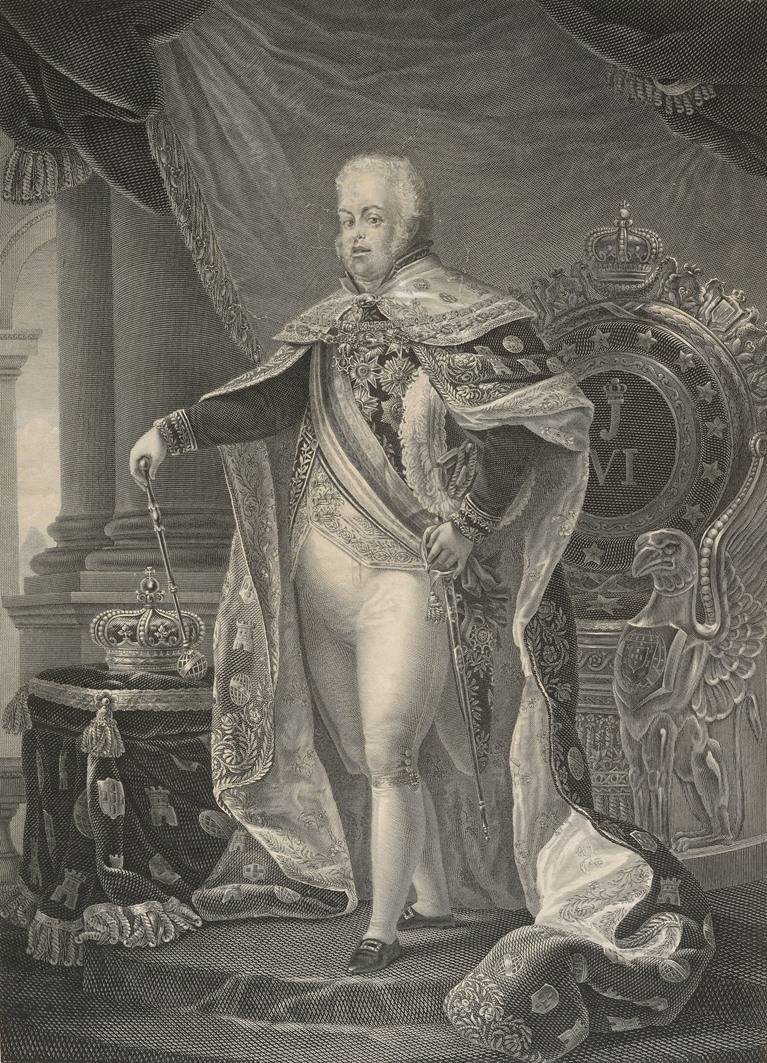
Juan, Prince Regent of Portugal, who managed to become King Joan VI
The corresponding secret agreement, another 27 of October 1807, was signed at Fontainebleau by Marshal Gerard Duroc and his Spanish counterpart, the king's favorite, who had the experience of Secretary of State and First Minister Manuel Godoy. On the march to Lisbon, along with the 8-thousandth Spanish corps, 28 thousands of Frenchmen were sent, and 40 thousands more entered Spain, to support the Portuguese expedition. Napoleon hoped to "change" the north of Portugal, already occupied by the French, in the province of Entre-Douro, gets the name of the North-kingdom Luzitanian.
For the sake of complete confidence in success, the emperor was ready to make happy not only the Spanish monarch Charles IV, but also to make Prince his favorite, the all-powerful generalissimo Godoy, who had among other things the title of “prince of the world”, whose main achievement was popularly called the queen's lover Marie-Louise. Godoyu owed the Portuguese province of Alentejo and Algarve, and for the connection to France, Napoleon outlined almost all the north of Spain until the Ebro. Here the emperor, too, was scheduled spectacular exchange - the whole of Portugal at once.
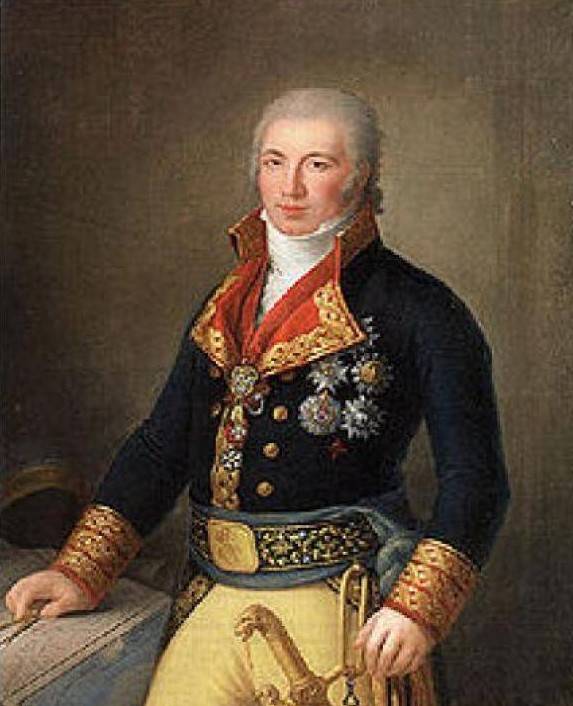
Manuel Godoy, favorite of the king, lover of the queen, generalissimo and "prince of peace"
His truly grandiose plans are not at all surprising - Napoleon then easily redrawed the borders of Europe, and set his relatives on thrones, as if he were rearranging pieces on a chessboard. To make such a sacrifice, as one of the “degenerated dynasties” - it was quite in the spirit of the Corsican. However, while surrounded by Napoleon not counted combination with the coronation of his brother Joseph in Madrid, all the more that the very good feeling in Naples. Nevertheless, the wobbly Spanish throne was certainly one of the factors that the French emperor was ready to use at any moment. “Spain has long been the object of my thoughts,” said Napoleon.
The 1 th Gironde Corps was formed as an observant under the command of General Junot back in August 1807, mainly from the conscripts of the new set. October 17 he crossed the Spanish border and in mid-November was already under Salamanca. The target was Lisbon, and although the Spanish government did little to support the march, Junot moved to the Portuguese capital a short way, where he was expected to have great supply difficulties. But in the same place, at Alcantara, an auxiliary Spanish corps was waiting for him. The hike was well supported by information - the whole of Europe started talking about the hike to Gibraltar.
With the accession of the Spaniards, the problem of supply has become even more acute. And although the aggressors in the Portuguese land did not encounter armed resistance, they were firmly inherited from a few local people. It responded to looting and looting with attacks on foragers and the killing of backward soldiers. The Prince Regent hurried to express his readiness to fulfill all the requirements of Napoleon, but this could not change anything.
On November 24, the army of General Andosh Junod, one of Napoleon’s few close friends who never received a marshal's baton, hungry and badly battered, arrived in Abrantes (now Abrantes). In honor of this town, General Ducne would later be granted the ducal title, although in the end, only Napoleon himself could call his trip to Portugal successful in his legendary bulletins. However, the first part of the Portuguese campaign was indeed more than successful.
From Abrantes Junot notified the Portuguese government that in four days he would be in Lisbon. By this time there is already anchored the British ships of Rear Admiral Smith Sydney, the man who managed in opposition to Bonaparte to defend Acre. The energetic Smith immediately declared Lisbon in a state of siege and suggested that the royal family be evacuated to Brazil. In Juneau at the time it was no more than 6 thousand able-bodied men and officers, and to the capital, he boldly walked only four battalions. This was the case when the very appearance of the French troops was worth the victory.
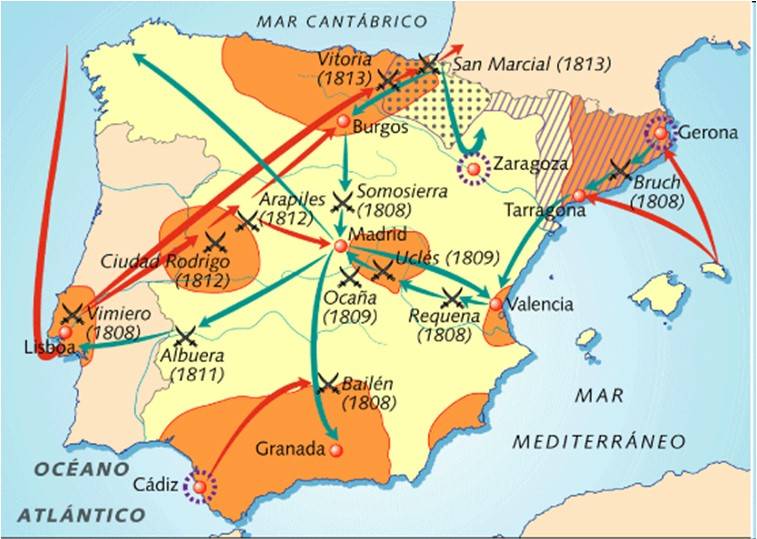
Lisbon fell without a fight in the last days of November 1807. The French even managed to fire Smith ships from Belem, stuck in the roadstead due to strong headwinds. When to the outskirts of the city it was already stretching to 16 of thousands of French, General Junot earnestly set about building a peaceful life. The regiments were located in cantoner-flats in the capital and its surroundings, the Spanish corps of the Marquis Solano occupied Setubal, Elvas and the province of Algarve, and the troops of General Taranco occupied the north of Portugal.
Junot simply disbanded a part of the Portuguese army, about 6 thousands of soldiers and officers joined the French divisions, and 12 thousands were sent to France. By this time, new French troops were entering Spain - the 2 of the Gironde Corps, also with supervisory functions, under the command of General Dupont with a force of 25 thousand people, and also 24 of the thousandth coastal corps of Marshal Monsey. Monsey's forces were stationed in Biscay, and Dupont occupied Valladolid, pushing the vanguard towards Salamanca. Napoleon, taking advantage of peace in Europe, continued to increase his military presence in the Pyrenees.
The situation around the Spanish throne was also pushing the emperor. The heir to the throne, Ferdinand, Prince of Asturias, who was at enmity with Godoy, was not hiding, sought the protection of Napoleon, and even turned to one of his nieces. This request remained unanswered, but the aged king responded with the arrest of his son in the Escorial castle, and Ferdinand was threatened with trial for insulting the supreme power. However, the arrest, organized with the filing of the same Godoy, did not last long.
At the turn of 1807 and 1808, French troops continued to accumulate in Spain. Moncei advanced to the river Ebro, and his troops replaced the West Pyrenean corps of Marshal Bessieres, who had put garrisons in Pamplona and San Sebastian. Corps Duhem, having entered Catalonia, settled in Figueres and Barcelona, although this required a direct deception of local authorities. 6 thousand guards under the command of General Dorsenna arrived in Bayonne. The general leadership of the army, which occupied the entire north of Spain without a war, was entrusted to Murat.
However, so far there have been no signs of possible popular indignation, although in the entourage of King Charles IV, it was increasingly said that the dynasty could wait for the same fate as the Braganz family. Moreover, the most enterprising people in the government began to prepare the departure of the royal family to Mexico. The first protest against the French took place directly in Aranjuez, the seat of the court. The rioters even managed to seize Minister Godoy himself, who was severely beaten and saved only as a result of the intervention of Prince Ferdinand.
Frightened by the king hurried to abdicate in favor of his son, but it had happened it gave the French a carte blanche to join Madrid. Murat entered the capital of March 23 with a guard and part of the corps of Monsey. All this time the Emperor himself remained above the fray, as it were, besides, he was too busy organizing the blockade, which would seem to have managed to involve the whole of continental Europe. However, the Emperor ordered the troops to advance towards Burgos Bessieres and Dupont, in order to avoid excesses, take Escorial, Aranjuez and Segovia.
The day after Murat, Ferdinand arrived in Madrid, met with enthusiasm by the people. In spite of the fact that the future Neapolitan king, and at that moment - only the Duke of Berg Murat, in every possible way shied away from intercourse with him, Ferdinand, already a monarch, reiterated his desire to preserve the alliance with France. He also repeated his offer to Napoleon’s niece. But at the same time, taking advantage of the fact that Murat ignored his son, Charles IV, he announced his abdication forced and asked for help, of course, to the French emperor.
Madrid
The stalemate led to the fact that Napoleon finally decided to intervene in Spanish affairs in person, and went to Madrid. Following him, following the advice of Murat and Savary, a diplomat and a former secret police chief who was in the Pyrenees as corps commander, Ferdinand left with his retinue. Edit in Madrid that "almost king" instructed junta headed by one of the most favorite among the people of relatives - uncles heir Don Antonio.
Ferdinand, who had come to Bayonne morning 20 April was received with royal honors, but it's time to implement a combination of Joseph seems to have come. On the evening of the same day, General Savary informed Ferdinand that Napoleon had decided to transfer the Spanish throne to one of the members of the Bonaparte dynasty. The emperor demanded from Ferdinand renunciation and offered him instead of Spain Etruria and Portugal.
The king himself, who was not yet crowned king, was detained at Bayonne, in fact, in the prisoner's position. Stendal described the situation briefly, but very succinctly: “it was just as difficult for Ferdinand to be held captive by Napoleon, as well as to return his freedom. It turned out that Napoleon had committed a crime - and could not take advantage of its fruits. ” The end was due to the fact that Ferdinand Charles IV's father, no longer the king, arrived in Bayonne.
In Bayonne, Napoleon not only achieved a double renunciation from the Spanish Bourbons, but also dragged through the representatives of the ruling junta a new constitution of the country and the election of his elder brother Joseph, the king of Naples, Joseph, to the throne. 1 August 1808 was established in Naples by Joachim Murat, Duke of Berg and Cleves, Marshal of France, and part-time Caroline’s spouse, the sister of the French Emperor Napoleon I Bonaparte.
Napoleon signs act of renunciation of Charles IV in Bayonne
It would seem that all the conditions in order to close the Spanish question were created, but the Spaniards managed to explode much earlier. May 2, as soon as it became known about the renunciation of the popular Ferdinand, a rebellion broke out in Madrid. The reasons for indignation were more than enough, and in addition to the renunciation of the "almost king." To begin with the fact that the French troops behaved in Spain like real invaders, they also freed Godoy, hated by everyone, who seemed about to be convicted. The rumors that Ferdinand was arrested, and that he would be expelled, only heightened indignation.
The revolt was really terrible, the Spaniards managed to kill up to six hundred Frenchmen in half a day, and many in the hospital, the pogroms spread to the suburbs, where several regiments were quartered. But this time, the French managed to restore order in just one night and day. The shooting of the rebels, depicted in colors by the great Goya, is undeniably impressive, but among the rebels the losses were four times smaller than those of the French - only 150 people. And no one disputes these figures.
Francisco Goya. The shooting of the rebels in Madrid 2 May 1808 of the year
But outrage quickly swept the whole country. In Zaragoza and Cadiz, in Valencia and Seville, in a multitude of small towns and villages, the population ruled against the French officers and Spanish officials, who were only suspected of loyalty to the invaders. But formally, there was no occupation, and Napoleon did not declare war on Spain, which he later regretted more than once.
The emperor himself again put himself in a stalemate. Everywhere in Spain, the ruling junta were created, usually supporting Ferdinand, and many of them, for example, the Asturian, almost immediately asked for help from England. First time in stories Spain showed what an armed people is - in a matter of days more than 120 thousand people took over weapon.
General Duhem’s troops were cut off from France in Barcelona, and Napoleon made all the necessary orders to maintain communication between Bayonne and Madrid. For him, the main thing was to preempt the Spaniards in concentrating large forces of regular troops, without the support of which, as he thought, “the crowd was worth nothing.”
It is possible that if Napoleon began to deal with the Bourbons in Spain, directly declaring war on Charles IV, he would have avoided a popular uprising. It is possible, even, that the Spaniards, who hated Godoy, and mocked the old monarchy, would have met the French as liberators - following the example of the Italians. Still, it is hard to believe those historians who, in this case, attribute to the emperor the usual desire to avoid bloodshed.
And of the more specific reasons, let us pay attention first of all to the composition of the troops that first entered Spain - with the exception of the guards, most of them were recruits, and only Napoleon himself led the already experienced soldiers after the Pyrenees. However, the analysis of the reasons for the next, in our account - the third major failure of Napoleon Bonaparte is still ahead.
To be continued ...
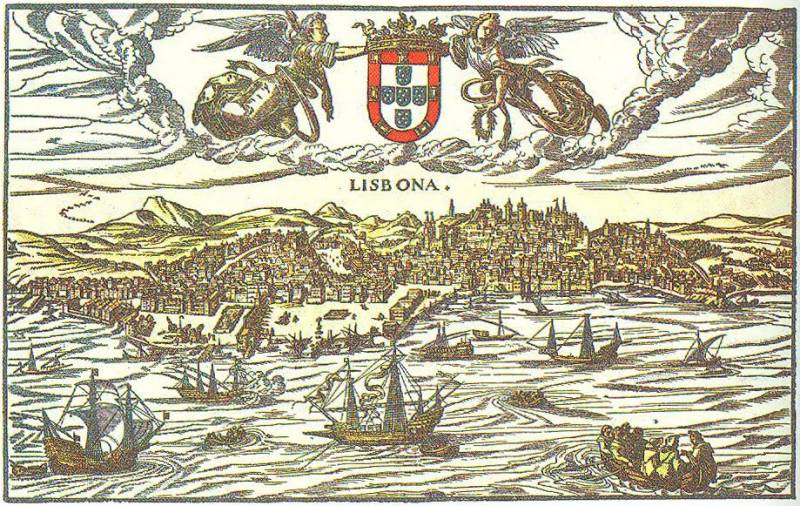
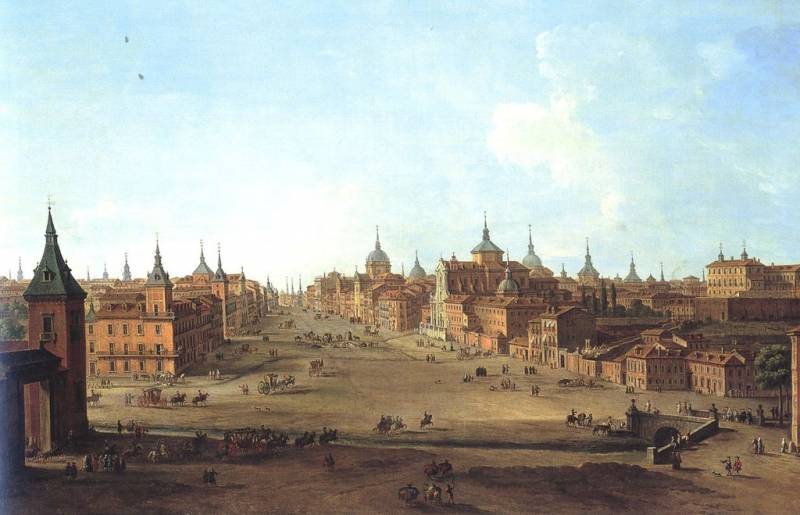
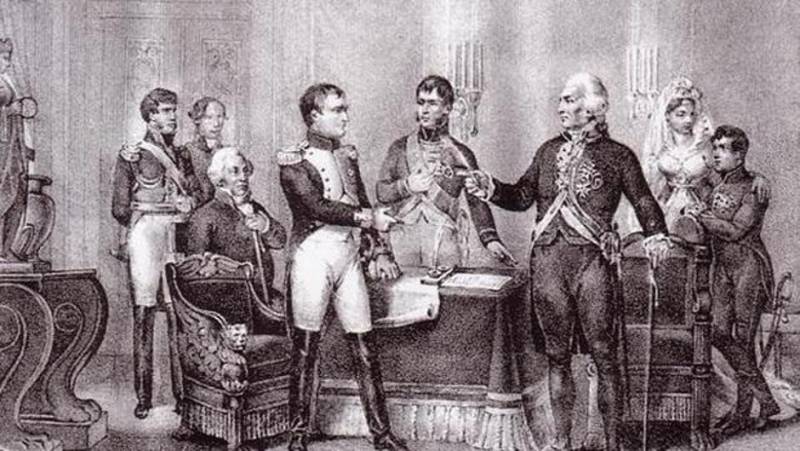
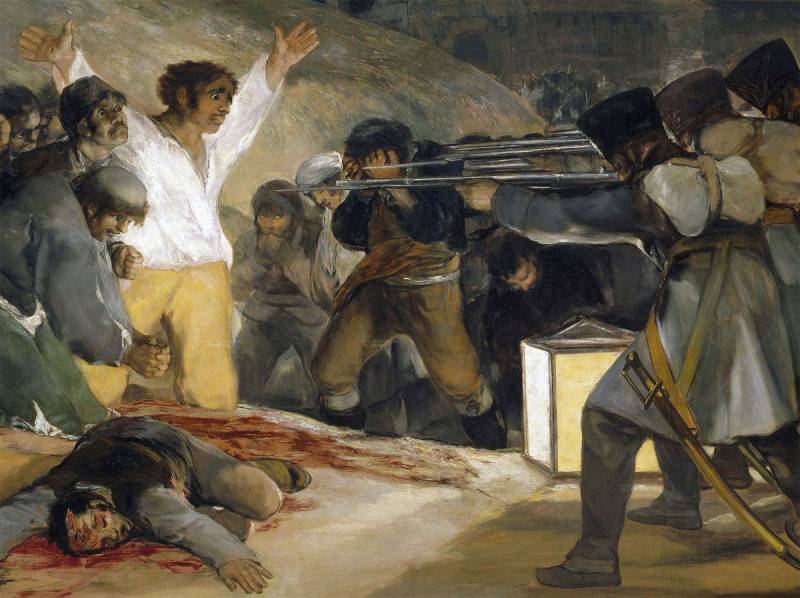
Information